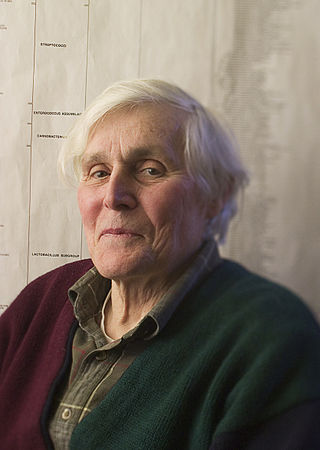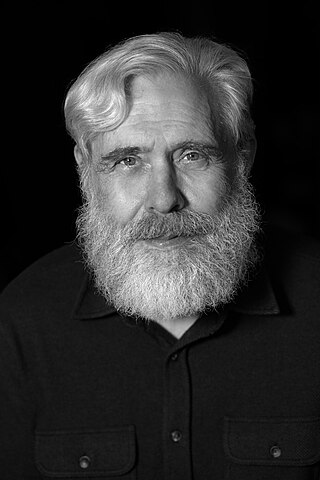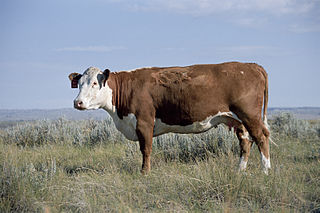Related Research Articles

Bioinformatics is an interdisciplinary field of science that develops methods and software tools for understanding biological data,especially when the data sets are large and complex. Bioinformatics uses biology,chemistry,physics,computer science,computer programming,information engineering,mathematics and statistics to analyze and interpret biological data. The process of analyzing and interpreting data can some times referred to as computational biology,however this distinction between the two terms is often disputed. To some,the term computational biology refers to building and using models of biological systems.

Carl Richard Woese was an American microbiologist and biophysicist. Woese is famous for defining the Archaea in 1977 through a pioneering phylogenetic taxonomy of 16S ribosomal RNA,a technique that has revolutionized microbiology. He also originated the RNA world hypothesis in 1967,although not by that name. Woese held the Stanley O. Ikenberry Chair and was professor of microbiology at the University of Illinois Urbana–Champaign.

Genomics is an interdisciplinary field of molecular biology focusing on the structure,function,evolution,mapping,and editing of genomes. A genome is an organism's complete set of DNA,including all of its genes as well as its hierarchical,three-dimensional structural configuration. In contrast to genetics,which refers to the study of individual genes and their roles in inheritance,genomics aims at the collective characterization and quantification of all of an organism's genes,their interrelations and influence on the organism. Genes may direct the production of proteins with the assistance of enzymes and messenger molecules. In turn,proteins make up body structures such as organs and tissues as well as control chemical reactions and carry signals between cells. Genomics also involves the sequencing and analysis of genomes through uses of high throughput DNA sequencing and bioinformatics to assemble and analyze the function and structure of entire genomes. Advances in genomics have triggered a revolution in discovery-based research and systems biology to facilitate understanding of even the most complex biological systems such as the brain.

BGI Group,formerly Beijing Genomics Institute,is a Chinese genomics company with headquarters in Yantian,Shenzhen. The company was originally formed in 1999 as a genetics research center to participate in the Human Genome Project. It also sequences the genomes of other animals,plants and microorganisms.

George McDonald Church is an American geneticist,molecular engineer,chemist,serial entrepreneur,and pioneer in personal genomics and synthetic biology. He is the Robert Winthrop Professor of Genetics at Harvard Medical School,Professor of Health Sciences and Technology at Harvard University and Massachusetts Institute of Technology,and a founding member of the Wyss Institute for Biologically Inspired Engineering at Harvard University.

The Human Genome Project (HGP) was an international scientific research project with the goal of determining the base pairs that make up human DNA,and of identifying,mapping and sequencing all of the genes of the human genome from both a physical and a functional standpoint. It started in 1990 and was completed in 2003. It remains the world's largest collaborative biological project. Planning for the project began in 1984 by the US government,and it officially launched in 1990. It was declared complete on April 14,2003,and included about 92% of the genome. Level "complete genome" was achieved in May 2021,with only 0.3% of the bases covered by potential issues. The final gapless assembly was finished in January 2022.
Gerald Mayer Rubin is an American biologist,notable for pioneering the use of transposable P elements in genetics,and for leading the public project to sequence the Drosophila melanogaster genome. Related to his genomics work,Rubin's lab is notable for development of genetic and genomics tools and studies of signal transduction and gene regulation. Rubin also served as a vice president of the Howard Hughes Medical Institute (2003–2020) and founding executive director of its Janelia Research Campus.

The genome of a female Hereford cow was published in 2009. It was sequenced by the Bovine Genome Sequencing and Analysis Consortium,a team of researchers led by the National Institutes of Health and the U.S. Department of Agriculture. It was part of an effort to improve livestock breeding and at the time was one of the largest genomes ever sequenced.
Gene Ezia Robinson is an American entomologist,Director of the Carl R. Woese Institute for Genomic Biology and National Academy of Sciences member. He pioneered the application of genomics to the study of social behavior and led the effort to sequence the honey bee genome. On February 10,2009,his research was famously featured in an episode of The Colbert Report whose eponymous host referred to the honey Dr. Robinson sent him as "pharmaceutical-grade hive jive".
The 1000 Plant Transcriptomes Initiative (1KP) was an international research effort to establish the most detailed catalogue of genetic variation in plants. It was announced in 2008 and headed by Gane Ka-Shu Wong and Michael Deyholos of the University of Alberta. The project successfully sequenced the transcriptomes of 1,000 different plant species by 2014;its final capstone products were published in 2019.

Jonathan Andrew Eisen is an American evolutionary biologist,currently working at University of California,Davis. His academic research is in the fields of evolutionary biology,genomics and microbiology and he is the academic editor-in-chief of the open access journal PLOS Biology.
Microbial phylogenetics is the study of the manner in which various groups of microorganisms are genetically related. This helps to trace their evolution. To study these relationships biologists rely on comparative genomics,as physiology and comparative anatomy are not possible methods.

The Carl R. Woese Institute for Genomic Biology (IGB) is an interdisciplinary facility for genomics research at the University of Illinois Urbana-Champaign. The Institute was built in 2006 to centralize biotechnology research at the University of Illinois. Current research at the IGB explores the genomic bases of a wide range of phenomena,including the progression of cancer,the ecological impact of global change,tissue and organ growth,and the diversity of animal behavior.
Scott Vernon Edwards is the Alexander Agassiz Professor of Organismal and Evolutionary Biology at Harvard University and the Curator of Ornithology at Harvard's associated museum,the Museum of Comparative Zoology.
The Earth BioGenome Project (EBP) is an initiative that aims to sequence and catalog the genomes of all of Earth's currently described eukaryotic species over a period of ten years. The initiative would produce an open DNA database of biological information that provides a platform for scientific research and supports environmental and conservation initiatives. A scientific paper presenting the vision for the project was published in PNAS in April 2018,and the project officially launched November 1,2018.
Nikos Kyrpides is a Greek-American bioscientist who has worked on the origins of life,information processing,bioinformatics,microbiology,metagenomics and microbiome data science. He is a senior staff scientist at the Berkeley National Laboratory,head of the Prokaryote Super Program and leads the Microbiome Data Science program at the US Department of Energy Joint Genome Institute.

Elizabeth Anna Ainsworth is an American plant physiologist currently employed by the University of Illinois at Urbana-Champaign. She previously worked for the United States Department of Agriculture (USDA) Agricultural Research Service (ARS). She is a Fellow of the American Association for the Advancement of Science (AAAS) and was awarded the 2018 Crop Science Society of America Presidential Award. She is known for researching the effects of atmospheric pollutants,including ozone and carbon dioxide,on the productivity of selected major crops such as corn and soybeans.
The UC Santa Cruz Genomics Institute is a public research institution based in the Jack Baskin School of Engineering at the University of California,Santa Cruz. The Genomics Institute's scientists and engineers work on a variety of projects related to genome sequencing,computational biology,large data analytics,and data sharing. The institute also maintains a number of software tools used by researchers worldwide,including the UCSC Genome Browser,Dockstore,and the Xena Browser.
The African BioGenome Project,or AfricaBP,is an international effort to sequence the genomes of all animals,all plants,all fungi,and all protists that are native to Africa at an estimated cost of $1 billion U.S. dollars. The project prioritizes doing its sequencing work and data storage within the African continent.
References
- 1 2 3 Azar, Beth (20 December 2016). "Profile of Harris A. Lewin". Proceedings of the National Academy of Sciences of the United States of America. 113 (51): 14468–14470. Bibcode:2016PNAS..11314468A. doi: 10.1073/pnas.1618868114 . PMC 5187711 . PMID 27956630.
- ↑ "Harris Lewin named director of Post Genomic Institute" (Press release). University of Illinois. 2 May 2003. Retrieved July 14, 2020.
- 1 2 3 "Harris Lewin Elected to National Academy of Sciences" (Press release). Carl R. Woese Institute for Genomic Biology. 30 April 2012. Retrieved July 14, 2020.
- 1 2 3 "Illinois professor awarded 2011 Wolf Prize in Agriculture" (Press release). University of Illinois. 15 February 2011. Retrieved July 14, 2020.
- 1 2 3 Lewin, Harris A.; Robinson, Gene E.; Kress, W. John; Baker, William J.; Coddington, Jonathan; Crandall, Keith A.; Durbin, Richard; Edwards, Scott V.; Forest, Félix; Gilbert, M. Thomas P.; Goldstein, Melissa M.; Grigoriev, Igor V.; Hackett, Kevin J.; Haussler, David; Jarvis, Erich D.; Johnson, Warren E.; Patrinos, Aristides; Richards, Stephen; Castilla-Rubio, Juan Carlos; van Sluys, Marie-Anne; Soltis, Pamela S.; Xu, Xun; Yang, Huanming; Zhang, Guojie (24 April 2018). "Earth BioGenome Project: Sequencing life for the future of life". Proceedings of the National Academy of Sciences. 115 (17): 4325–4333. Bibcode:2018PNAS..115.4325L. doi: 10.1073/pnas.1720115115 . PMC 5924910 . PMID 29686065.
- ↑ "Introduction". Annual Review of Animal Biosciences. 1. 2013. doi:10.1146/annurev-av-1-012513-100001.
- ↑ "Harris Lewin | College of Biological Sciences". biosci3.ucdavis.edu. Archived from the original on 2015-09-06.
- ↑ "Harris A. Lewin, Ph.D." www.igb.illinois.edu. Archived from the original on 2016-08-12.
- ↑ "Personnel, Laboratory of Mammalian Genome Biology, University of Illinois at Urbana-Champaign". lewinlab.igb.uiuc.edu. Archived from the original on 2008-07-08.
- ↑ "History". Carl R. Woese Institute for Genomic Biology . Retrieved 7 November 2015.
- ↑ "Research VC Lewin to Step Down". UC Davis. 9 February 2016. Retrieved 2017-07-27.
- ↑ Pennisi, Elizabeth (24 February 2017). "Biologists propose to sequence the DNA of all life on Earth". Science. doi:10.1126/science.aal0824.
- ↑ "How a Genetic Mutation From 1 Bull Caused the Loss of Half a Million Calves Worldwide" (Press release). UC Davis. 13 October 2016. Retrieved July 14, 2020.
- ↑ Zhang, Sarah (31 October 2016). "The Dairy Industry Lost $420 Million From a Flaw in a Single Bull". The Atlantic.
- ↑ Main, Douglas (15 November 2016). "One bull's genes gave 14 percent of U.S. dairy cows a deadly mutation". Newsweek.
- ↑ "El ejemplar de toro que transformó la industria lechera mundial" [The bull that transformed the world dairy industry with 16,000 calves]. BBC News Mundo (in Spanish). 1 November 2016.
- ↑ "Cow Gene Study Shows Why Most Clones Fail". UC Davis. 9 December 2016. Retrieved 2017-07-27.
- ↑ Kim, Jaebum; Farré, Marta; Auvil, Loretta; Capitanu, Boris; Larkin, Denis M.; Ma, Jian; Lewin, Harris A. (3 July 2017). "Reconstruction and evolutionary history of eutherian chromosomes". Proceedings of the National Academy of Sciences. 114 (27): E5379–E5388. Bibcode:2017PNAS..114E5379K. doi: 10.1073/pnas.1702012114 . PMC 5502614 . PMID 28630326.
- ↑ "Reconstruction of Ancient Chromosomes Offers Insight Into Mammalian Evolution". UC Davis. 21 June 2017. Retrieved 2017-07-27.
- ↑ "Earth BioGenome Project to Sequence All Life". UC Davis. 23 January 2018. Retrieved 2018-09-06.
- ↑ "New Partnership Aims to Sequence Genomes of All Life on Earth, Unlock Nature's Value, Tackle Bio-Piracy and Habitat Loss". World Economic Forum. Retrieved 2018-09-06.